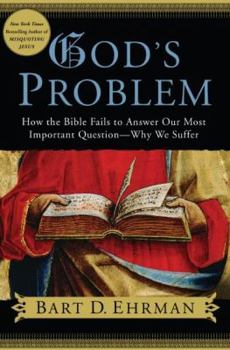God's Problem: How the Bible Fails to Answer Our Most Important Question-Why We Suffer
Select Format
Select Condition 
Book Overview
In times of questioning and despair, people often quote the Bible to provide answers. Surprisingly, though, the Bible does not have one answer but many "answers" that often contradict one another. Consider these competing explanations for suffering put forth by various biblical writers: The prophets: suffering is a punishment for sin The book of Job, which offers two different answers: suffering is a test, and you will be rewarded later for passing it; and suffering is beyond comprehension, since we are just human beings and God, after all, is God Ecclesiastes: suffering is the nature of things, so just accept it All apocalyptic texts in both the Hebrew Bible and the New Testament: God will eventually make right all that is wrong with the world For renowned Bible scholar Bart Ehrman, the question of why there is so much suffering in the world is more than a haunting thought. Ehrman's inability to reconcile the claims of faith with the facts of real life led the former pastor of the Princeton Baptist Church to reject Christianity. In God's Problem , Ehrman discusses his personal anguish upon discovering the Bible's contradictory explanations for suffering and invites all people of faith--or no faith--to confront their deepest questions about how God engages the world and each of us.
Format:Hardcover
Language:English
ISBN:0061173975
ISBN13:9780061173974
Release Date:February 2008
Publisher:HarperOne
Length:304 Pages
Weight:1.20 lbs.
Dimensions:1.0" x 6.0" x 9.0"
Customer Reviews
3 ratings
Can the World's Suffering be Reconciled to a Benevolent God?
Published by Thriftbooks.com User , 17 years ago
Bart Ehrman writes in heart-felt eloquent prose about his inability to reconcile a loving God with the world's suffering and scrutinizes the Bible's various explanations--suffering leads to wisdom and redemption; suffering is God's punishment for our sins; suffering is an inevitable consequence for man's "free will"--for suffering and argues that these explanations are not convincing. His book is not merely a theological exploration but a deeply personal chronicle of a man, a former evangelist, pastor, and true believer--who goes through a "deconversion experience." He longs to have his faith again and to have the comfort of eternal life with his Maker, but his scholarly research into the Bible has, as he points out in this book and other books, led him to conclude three things: The Bible was written by men with various agendas, some political; the Messiah believed the world would end before his apostles died and mistaken as such was not a divine personality; and that the world's suffering can not be explained by theology theories that strive to defend the notion of a benevolent and omnipotent god. Foregoing the comfort of salvation and still admitting to waking up in the middle of the night in a cold sweat over the possibility that he might spend eternity in hell for betraying his faith, Ehrman writes that he cannot have any integrity if he denies the insurmountable problems the world's suffering pose against the idea of an all-loving god and he is left to struggle with his agnosticism. This is a very intelligent, very smart, and, yes, a very human and honest book.
Checkmate
Published by Thriftbooks.com User , 17 years ago
I liken Ehrman to an intelligent chess player who puts the squirming reader (who may not, at first, be inclined to agree with him) into methodical and logical checkmate. Ehrman shows why all the traditional moves that people make to explain suffering are, ultimately, inadequate, unsatisfying, or inhumane. He takes the reader on a guided tour of how different biblical authors attempt to explain suffering, beginning with the prophets Amos and Hosea and concluding with Revelation. Naturally, no Biblical author gives an adequate answer to the problem of suffering, and most give a rather reductive or simplistic answer. In many cases the Biblical authors' answers cannot, logically, cohere together. Periodically Ehrman points the reader to literature that dramatizes the problem of suffering (recommending, for example, the poems of Wilfred Owen and a play about Job written by Archibald MacLeish titled "J.B"). In short, Ehrman's book is a well written, honest reflection on the problem of suffering. It makes clear the logical and ethical issues posed when one turns to the Bible for "help" on this issue.
Faith vs. Reason
Published by Thriftbooks.com User , 17 years ago
Bart Ehrman poses many questions all Christians should consider. He never suggests that everyone should follow him in leaving the Christian faith. However, he does discourage blind faith. Ehrman's books are as popular with my Christian colleagues who are secure in their faith as they are with my agnostic and atheist colleagues. It is my experience that his worst critics are individuals who don't wish to have their beliefs put to the test.






